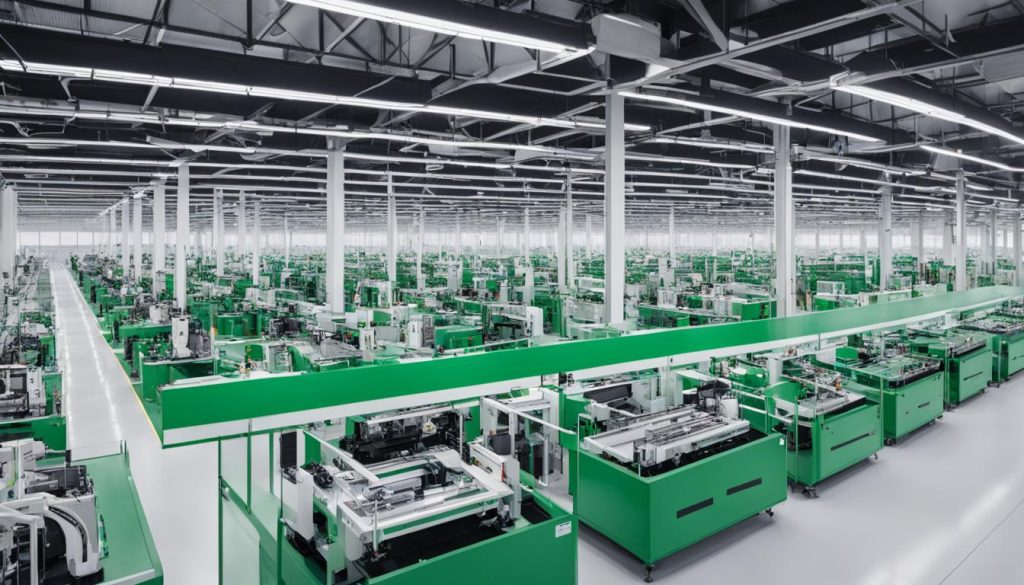Welcome to the transformative era of the fashion industry in 2024, where sustainability takes center stage. If you’re looking to make stylish and eco-friendly choices, you’ve come to the right place. In this article, we’re going to introduce you to the top eco-friendly sustainable fashion brands of 2024. These brands prioritize ethical production, eco-friendly practices, and timeless design, making them the perfect choice for conscious consumers like you. By supporting these brands, you can contribute to a more sustainable and stylish future.
But before we dive into the brands, let’s explore the shift towards sustainable fashion and the rise of eco-consciousness in the industry. Embracing sustainability is no longer just a trend – it’s a movement that’s here to stay. The fashion industry has witnessed a significant evolution with more brands adopting eco-friendly practices. In section 2, we will delve into the rise of eco-conscious fashion and highlight some leading examples.
Embracing Sustainability: The Rise of Eco-conscious Fashion
The landscape of sustainable fashion has evolved significantly, with more brands adopting eco-friendly practices. In 2024, we see a diverse range of sustainable clothing brands that prioritize ethical production, environmental sustainability, and timeless design. These brands, such as PANGAIA, Vuori, and Finisterre, are leading examples of the eco-conscious fashion movement.
With a commitment to creating fashion that is not only stylish but also environmentally friendly, eco-conscious fashion brands are driving change within the industry. These brands firmly believe that fashion should not come at the cost of the planet and are dedicated to implementing sustainable practices throughout their supply chains.
By using organic and natural materials, eco-conscious fashion brands minimize the use of harmful chemicals and reduce their environmental impact. They prioritize fair trade, ensuring that workers receive fair wages and safe working conditions. Additionally, these brands actively seek to minimize waste and reduce their carbon footprint through innovative manufacturing processes.
The popularity and influence of sustainable fashion brands like PANGAIA, Vuori, and Finisterre demonstrate that consumers are becoming increasingly conscious of the environmental and ethical implications of their fashion choices. As more people embrace the idea of eco-conscious fashion, the demand for sustainable clothing brands continues to grow.
Eco-conscious fashion not only benefits the environment but also allows individuals to express their personal style in a way that aligns with their values. By supporting these brands, you can make a positive impact on the planet without compromising on fashion and quality.
Regulatory Shifts: Setting New Standards in Fashion Sustainability

In 2024, the fashion industry is experiencing a significant shift towards sustainability. To standardize sustainable practices, new fashion sustainability regulations have been introduced. These regulations aim to ensure that brands meet sustainable fashion standards and prioritize eco-friendly practices.
One such regulation is the Green Claims Directive. Under this directive, brands are required to provide scientific evidence to support any environmental claims they make. This verification process ensures that consumers can trust the sustainability claims made by fashion brands.
Another important regulatory development is the EU Strategy for Sustainable and Circular Textiles. This strategy focuses on promoting sustainable practices and advancing the circular economy in the textile industry. One of the key mandates of this strategy is the implementation of textile recycling and the introduction of eco-labeling. By encouraging the recycling of textiles and providing clear labeling, the EU aims to drive sustainable practices in the fashion industry.
These regulatory shifts are instrumental in pushing the fashion industry towards sustainability and circularity. By adhering to these regulations and adopting sustainable practices, brands can contribute to a more environmentally friendly and socially responsible fashion industry.
Creating a Circular Economy
The EU Strategy for Sustainable and Circular Textiles plays a crucial role in creating a circular economy within the fashion industry. Through textile recycling and eco-labeling, this strategy aims to minimize waste and maximize resource efficiency. By embracing a circular economy, the fashion industry can reduce its impact on the environment and foster more sustainable practices.
Fast Fashion vs. Sustainable Fashion: The Ongoing Battle
As the demand for sustainable fashion continues to grow, the fast fashion industry remains a dominant force in the market. With projected revenues in the billions, fast fashion brands maintain a significant share of the apparel industry, overshadowing the comparatively smaller sustainable fashion market. This ongoing battle between fast fashion and sustainable fashion highlights the need for consumer education and the promotion of sustainable fashion practices.
Sustainable fashion practices prioritize ethical production, environmental sustainability, and social responsibility. By supporting sustainable fashion, you contribute to a more conscious and eco-friendly future. However, with fast fashion’s affordability and constant churn of new trends, it can be challenging for consumers to resist its allure.
Educating consumers about the environmental and social impacts of fast fashion is crucial in encouraging them to make sustainable choices. Awareness campaigns, industry-wide initiatives, and consumer education programs can empower individuals to make informed decisions about their fashion consumption.
Additionally, brands and retailers play a significant role in driving change. By adopting sustainable fashion practices, investing in ethically sourced materials, and promoting transparency, they can inspire consumer confidence and contribute to a more sustainable fashion industry.
Ultimately, the battle between fast fashion and sustainable fashion goes beyond individual choices. It requires a collective effort to transform the industry and make sustainable fashion the new norm. By supporting sustainable fashion brands, advocating for change, and embracing sustainable fashion practices in our own lives, we can drive the shift towards a more sustainable future for fashion.
Hyper-digitalization: AI’s Role in Fashion Sustainability

In today’s rapidly evolving fashion industry, the integration of AI, also known as hyper-digitalization, is playing a crucial role in driving sustainability initiatives. AI technology holds immense potential in optimizing supply chains, reducing waste, and improving overall sustainability practices.
By leveraging AI algorithms and machine learning, fashion brands can streamline their supply chains, benefiting both the environment and the industry as a whole. AI can analyze vast amounts of data to identify inefficiencies and recommend strategic solutions for optimal resource allocation.
Additionally, AI-powered systems can aid in reducing waste throughout the fashion lifecycle. By accurately predicting consumer demand and optimizing production processes, brands can minimize overproduction, leading to a significant reduction in textile waste. This, in turn, supports the circular economy and promotes sustainable consumption.
Beyond supply chain optimization and waste reduction, AI technology offers innovative solutions for enhancing sustainability practices. For example, AI-enabled systems can assess the environmental impact of different materials, helping brands make informed decisions when selecting fabrics and manufacturing processes.
Moreover, AI can play a vital role in enhancing garment durability and lifespan. By analyzing customer feedback and product performance data, AI algorithms can provide valuable insights into improving product quality and longevity.
The influence of AI on fashion sustainability extends beyond production and consumption. AI-powered image recognition technology can aid in identifying counterfeit products, ensuring consumers make ethical choices when purchasing fashion items.
To illustrate the impact of AI in fashion sustainability, consider the optimization of supply chains, reduction of waste, and enhancement of sustainability practices. As technology continues to advance, AI will be an indispensable tool in achieving the fashion industry’s sustainability goals.
The Role of AI in Optimizing Supply Chains
One significant area where AI is making a difference is in optimizing fashion supply chains. By leveraging AI’s capabilities, brands can analyze data in real-time, allowing for efficient inventory management and demand forecasting. This ensures that production aligns with consumer needs, reducing excess inventory and waste.
AI-driven systems can also help fashion brands make more sustainable choices by identifying the most efficient distribution routes, reducing carbon emissions associated with transportation. Overall, AI’s role in optimizing supply chains is paramount in achieving environmentally friendly and efficient operations.
The integration of AI into the fashion industry is a testament to the power of technology and sustainability. As brands continue to embrace hyper-digitalization, we can expect to see significant advancements in reducing waste, optimizing supply chains, and ultimately, creating a more sustainable future for fashion.
The Rise of Resale and Takeback Programs
Resale and takeback programs have become incredibly popular in the fashion industry. With these programs, you have the opportunity to extend the lifespan of your clothing by either reselling it or returning it to the brand. This not only promotes circular fashion but also helps in reducing waste.
By participating in resale programs, you can give your clothes a second life and contribute to a more sustainable fashion economy. Brands like 10Days, Beaumont Organic, and For Days have successfully implemented these programs, allowing you to make a positive impact on the environment by choosing quality, pre-loved fashion.
Takeback programs, on the other hand, enable you to return your old garments to the brand. This ensures that they will be properly recycled or repurposed instead of ending up in a landfill. These programs support circular fashion, where materials are kept in use for as long as possible, reducing the need for new production and minimizing the fashion industry’s environmental footprint.
The Benefits of Resale and Takeback Programs
The rise of resale and takeback programs brings numerous benefits to both consumers and the environment. By participating in these programs:
- You can extend the lifespan of your garments, reducing the need for continuous production and consumption.
- You have the opportunity to earn money by reselling your gently used clothing, making sustainable choices financially beneficial.
- You contribute to the circular economy by keeping valuable resources in use and minimizing textile waste.
- You support brands that prioritize sustainability, encouraging more fashion companies to adopt similar initiatives.
- You can discover unique and pre-owned fashion pieces, embracing individuality and reducing your ecological footprint.
Resale and takeback programs play a vital role in the journey towards a more sustainable fashion industry. By actively participating in these programs, you become an agent of change and help pave the way for a more environmentally conscious and responsible fashion future.
Beyond Carbon Neutrality: A Call for Proactive Sustainability
The concept of carbon neutrality is being challenged as brands are called to adopt more proactive sustainability measures. Simply offsetting carbon emissions is no longer enough. There is a growing recognition that deeper actions towards environmental conservation are necessary to truly make a positive impact. Proactive sustainability efforts are crucial for the future of sustainable fashion.
As the fashion industry strives for climate neutrality, it is essential to go beyond carbon offsetting and focus on sustainable fashion practices that address the root causes of environmental degradation. Brands need to take proactive measures to minimize their environmental footprint throughout their supply chains, from sourcing raw materials to manufacturing and distribution.
One effective approach to proactive sustainability is investing in renewable energy sources. By transitioning to renewable energy, fashion companies can significantly reduce their greenhouse gas emissions and decrease their reliance on fossil fuels. This commitment not only helps mitigate climate change but also sets a positive example for other industries to follow.
Implementing circular economy principles
Another crucial aspect of proactive sustainability in the fashion industry is adopting circular economy principles. Instead of following a linear model of production and disposal, circular fashion practices focus on extending the lifespan of garments and minimizing waste.
Brands can embrace circularity by designing durable and timeless clothing, using eco-friendly materials, and implementing takeback programs and resale initiatives. These efforts promote a more sustainable and circular fashion economy, reducing the strain on resources and minimizing the environmental impact.
Furthermore, incorporating sustainable practices into the manufacturing process is essential. This includes minimizing water usage, implementing efficient waste management systems, and prioritizing ethical labor practices. By proactively addressing these aspects, brands can create a positive ripple effect throughout the industry and inspire others to follow suit.
Driving environmental conservation
Environmental conservation should be at the forefront of sustainable fashion practices. Brands need to think beyond their immediate ecological impact and consider their long-term contributions to biodiversity and ecosystem preservation.
This involves supporting initiatives that protect and restore natural habitats, partnering with organizations dedicated to wildlife conservation, and implementing regenerative farming practices to reduce the use of harmful chemicals in agriculture.
Furthermore, transparency and accountability are crucial in driving proactive sustainability. Brands should communicate their sustainability goals, progress, and challenges to consumers, enabling informed choices and fostering a sense of shared responsibility.
A collective effort for a sustainable future
Proactive sustainability in the fashion industry requires a collective effort from brands, consumers, and policymakers. By making conscious choices and supporting brands that prioritize environmental conservation, we can drive the necessary change towards a more sustainable future.
Together, we can go beyond carbon neutrality and embrace a proactive approach to sustainability in the fashion industry. By demanding transparency, promoting circular economy principles, and driving environmental conservation, we can create a more sustainable and responsible fashion ecosystem that benefits both present and future generations.
The Future of Sustainable Fashion: What Lies Ahead
The future of sustainable fashion is promising, with significant growth and innovation on the horizon. As sustainability becomes increasingly important in the fashion industry, we can expect to see key developments that pave the way for a more environmentally conscious and socially responsible future.
One of the major shifts we anticipate is the rise of circular business models. Circular fashion focuses on reducing waste and maximizing resource efficiency by extending the lifespan of garments through resale and rental. This shift will provide consumers with more sustainable alternatives while reducing the industry’s overall carbon footprint.
Overproduction has long been a challenge in the fashion industry, leading to excessive waste and unsustainable practices. In the future, reducing overproduction will be a priority. Brands will focus on producing higher quality items, creating timeless designs that withstand trends and encourage conscious consumption.
The Rise of Resale and Rental
In the quest for a more sustainable fashion industry, resale and rental platforms will play a crucial role. These platforms allow consumers to give new life to pre-loved garments, reducing the demand for new production. By embracing resale and rental, consumers can contribute to a circular fashion economy and make more sustainable fashion choices.
Resale platforms such as thredUP and Depop offer a wide range of second-hand clothing, making it easier than ever to find unique and stylish pieces. Rental platforms like Rent the Runway enable customers to enjoy high-quality designer garments for a limited period, reducing the need for single-use purchases.
Innovation for Sustainable Fashion
Innovation will continue to drive the future of sustainable fashion. Designers and brands are exploring new materials and technologies to create eco-friendly and socially responsible products.
One area of innovation is the development of sustainable fabrics made from recycled materials or organic fibers. Brands like PANGAIA utilize natural materials such as hemp and promote sustainable practices throughout their supply chains.
Additionally, advancements in technology will enable greater transparency and traceability in the fashion industry. Blockchain technology, for example, can ensure the authenticity and sustainability of products, giving consumers peace of mind and supporting ethical production practices.
As we look ahead, it is important to remember that the future of sustainable fashion relies on collective action. By making conscious choices as consumers and supporting brands that prioritize sustainability, we can shape a future where fashion and environmental responsibility go hand in hand.
PANGAIA: Innovating with Natural Materials
PANGAIA is a brand that stands out in the sustainable fashion industry through its dedication to sustainable fabrics and environmental initiatives. The company focuses on using natural materials that prioritize both style and eco-consciousness.
One of PANGAIA’s notable innovations is its use of plant-based denim made from hemp. Hemp is a sustainable alternative to traditional denim fabrics as it requires less water, pesticides, and land to grow. By incorporating hemp into their products, PANGAIA reduces their environmental impact without compromising on quality or style.
Furthermore, PANGAIA goes beyond fabric choices and actively engages in environmental initiatives. The brand has launched several initiatives to raise awareness and protect bees, recognizing their importance in sustaining ecosystems. By promoting bee conservation, PANGAIA demonstrates a holistic approach to sustainability, weaving environmental initiatives into their brand ethos.
Through their commitment to using sustainable fabrics and supporting environmental causes, PANGAIA has become a leader in the sustainable fashion industry. By choosing PANGAIA, you are not only making a fashion-forward choice but also contributing to a more sustainable future for our planet.
Vuori: Climate-Neutral Commitments
Vuori, a California-based brand, is dedicated to sustainability and has made significant climate-neutral commitments. As part of their eco-friendly practices, Vuori has achieved 100% climate-neutrality. They prioritize reducing their carbon footprint and are actively involved in plastic reduction initiatives.
One of Vuori’s key efforts is their commitment to reducing plastic use. They recognize the detrimental impact of plastic on the environment and strive towards minimizing their plastic consumption. By embracing sustainable alternatives and promoting awareness, Vuori actively contributes to the reduction of plastic waste.
Moreover, Vuori goes above and beyond in supporting environmental programs. They actively participate in deforestation prevention initiatives, which are crucial for preserving our planet’s rich biodiversity. Additionally, Vuori engages in emission reduction projects, aiming to minimize their environmental impact and promote a greener future.
With their climate-neutral commitments, Vuori sets an example for others in the fashion industry. By prioritizing eco-friendly practices, reducing plastic use, and supporting crucial environmental programs, Vuori establishes itself as a leader in sustainable and conscious fashion.
Finisterre: Championing Ocean Awareness
When it comes to sustainable fashion for ocean lovers, Finisterre is a brand that stands out. With a deep commitment to ocean conservation, Finisterre incorporates sustainable ocean materials into their products, helping to protect our precious marine ecosystems.
Finisterre uses biodegradable fibers and recycled textiles derived from ocean plastic, making it a leader in promoting a circular economy. By repurposing materials that would otherwise harm our oceans, Finisterre actively contributes to reducing waste and minimizing their environmental impact.
Through their innovative use of sustainable ocean materials, Finisterre aims to raise awareness about the urgent need to protect our oceans and inspire consumers to take sustainable actions.
Conclusion
The sustainable fashion industry in 2024 is rapidly gaining momentum, with an increasing number of brands embracing eco-friendly practices and ethical production. By supporting these eco-friendly sustainable fashion brands, you can contribute to a more sustainable and responsible fashion future.
The future of sustainable fashion holds immense potential for growth and innovation. We can expect a significant shift towards circular business models, such as resale and rental, which offer consumers more sustainable alternatives. Reducing overproduction and emphasizing quality over quantity will also play a crucial role in lowering the industry’s carbon footprint.
Your choices and actions as a consumer are pivotal in shaping the future of sustainable fashion. By making sustainable choices and opting for eco-friendly sustainable fashion brands, you can make a positive impact on the planet. Whether it’s supporting PANGAIA’s use of sustainable fabrics, Vuori’s climate-neutral commitments, or Finisterre’s ocean conservation efforts, every decision counts.
Together, we can create a fashion industry that prioritizes ethical practices, environmental conservation, and sustainable choices. Let’s embrace the power we hold as consumers and lead the way towards a more sustainable and stylish future.







